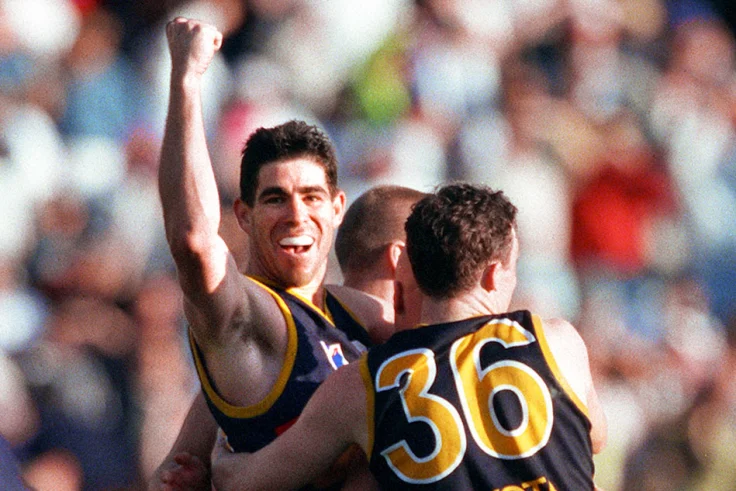The effects of head trauma suffered by our clients in the AFL concussion class action include cognitive impairment, memory loss and loss of motor functions.
17.07.2023
When an AFL great could not remember his own finals heroics
Jon Pierik – The Age
All hope seemed lost for Adelaide in the 1997 preliminary final against the Western Bulldogs when they trailed by 31 points at half-time.
That was until Darren Jarman was sent forward – and the dynamic star finished with three goals and a direct hand in another, as the Crows conjured an epic two-point win at the MCG.

However, in the minutes after the siren, Jarman’s lawyer said on Friday, the champion did not even know who had won and that he had speared his side into its maiden grand final.
Greg Griffin, a guest speaker at a concussion summit in Melbourne on Friday, used this as an example of why he claims the AFL had failed players on game day and in the recovery stages of serious head knocks.
The league is facing two class actions from 100 former players, including John Barnes, Chad Rintoul, Shaun Smith, John Platten, Jay Schulz, Daryn Cresswell and Jarman, and which the Supreme Court of Victoria has said it wants to be heard as one, over the treatment of concussion since 1986 and the long-term impact this has had on former players.
As footage was shown of several players and the head knocks they had endured, Griffin recalled Jarman’s heroics against the Bulldogs, and a week later when he booted six goals against St Kilda to give the Crows their inaugural flag.
“We had players who were never taken off after concussions,” Griffin said.
“Darren is actually knocked unconscious in the 1997 prelim against Western Bulldogs in the second quarter. He is out. He is actually punched, and the player who did it [James Cook, who pleaded guilty to striking Jarman, was suspended for two matches for the incident] was reported. The doctor has got him in the middle of the ground, and he is looking at the bench, saying, ‘What do we do?’
“Of course, instead of taking him off, he was seriously damaged, he got put in the forward pocket. Adelaide were not doing well. And the coaching staff and medical staff decided their prospects of winning that prelim would be greatly enhanced by Darren Jarman being on the field, and not being looked after in the rooms.
“Darren, like all footballers, did what the coach says. He stayed on … he goes to the forward pocket. In the third quarter, he gets absolutely cleaned up again.
“He is concussed again – not to worry because that is life, he is a professional footballer.
“In the last quarter, he kicks two goals and hands out another one, and wins the game. After the game, the doctor walks up to him and says, ‘How do you feel?’ Darren looked at him, his response to that question was, ‘Who won?’
“All of us have played football. If you have ever kicked two in the last quarter and gave away a third, and you came back from six goals down, and you were the cause of that comeback, you would probably know who won.
“He was flown home, brought back to play in the grand final against St Kilda, and kicked five in the last quarter. Adelaide Crows got a massive benefit from keeping Darren Jarman on the field that day. The question is, at what price was paid to Darren?”
In court documents lodged in the Victorian Supreme Court and released to The Age in March, Jarman and Schulz allege they suffered brain injuries and loss and damages as a result of alleged failures by the AFL and their respective football clubs.
The documents claim each former player has either been diagnosed with traumatic encephalopathy syndrome (TES) or are showing signs of the condition, including cognitive impairment, memory loss, loss of executive function, behavioural changes, mood disorders and loss of motor functions.
The Crows were contacted for comment on Friday.
The case continues as a senate inquiry into concussion in sport, at which the AFL presented, prepares to deliver its findings on August 2.
John Hennessy, a former Victorian Football League corporate planner who helped steer the development of the national competition in the 1980s, said, “players had been left behind” in terms of the league’s investment in head trauma, and insists “sub-concussive” hits are a major issue for female players.
Concussion campaigner Peter Jess continues to push for players to have a concussion passport, which would list all of their head knocks. Jess, who is also involved in Griffin’s class action, maintains the AFL’s 12-day minimum rest for head trauma is too short, advocating a minimum four-week recovery.
The league stresses the 12-day break is the minimum, and clubs do not recall players until they have passed the required testing. The AFL has repeatedly pointed to 30 match review and tribunal changes it has made over the past decade in a bid to mitigate head knocks. This includes a crackdown this season on illegal tackles.
AFL chief executive-elect Andrew Dillon, the league’s general counsel Stephen Meade, AFLW boss Nicole Livingstone and AFL Players Association chief Paul Marsh were invited to present at the summit, but the AFL said on Friday the league representatives chose not to because of the impending legal action.

Licensed by Copyright Agency. You must not copy this work without permission